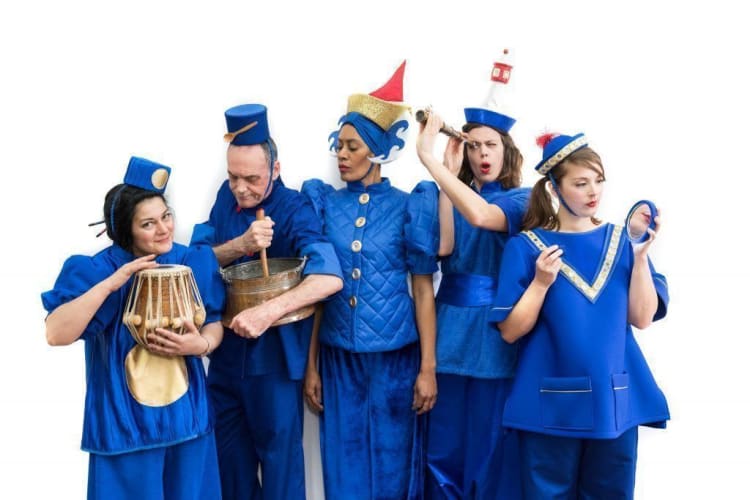Inspired by Samuel Coleridge’s poem, which provides the text, this production has been developed in three different forms designed for three different audiences. One version is for young people with Profound and Multiple Learning Disabilities (PMLD), another version is for those with an Autistic Spectrum Condition (ASC) and the third is for the deafblind, with or without any cognitive impairment. I saw the third, perhaps the most challenging to create and a relatively recent development in the range of work produced by this remarkable company.
As with all three forms, it is performed for an audience of just six, accompanied by their carers, with the possibility of a further six observers seated on the perimeter of the performance space.
Coleridge’s ideas and language may seem very demanding for any audience but it is the spirit of the poem and its sensory stimulus that are of interest here. There is no need for an intellectual understanding as participants are taken on a journey down the River Alph to meet the Emperor.
As with almost every Oily Cart performance, participants first meet up with the performers in what is here called an “Oasis” zone to ensure that there will be no unwelcome surprises. Preparatory material is also offered to schools and carers so that participants can more fully enjoy the experience. It is there that they don a special red cape (the Emperor’s favourite colour) to keep their clothes dry on their voyage.
The company tries to obtain advance information or find out through this meeting with participants and careers the extent of each individual’s disability and things which they enjoy, particularly respond to or be scared by. Performers have to be continually alert to each person’s reactions and shape the way they deliver the show’s experiences accordingly. One child I observed was testing things with their mouth, one was wearing glasses so clearly had some vision, another might be totally blind, the extend of deafness will also vary.
Having been introduced to their Captain (Katherine Gray) the ship’s Cook (Griff Fender), the Look-out (Stephanie Rutherford) with her telescope, another Sailor (Deanne Jones) and Sheema, the Captain’s Musician (Sheema Muckherjee) they are led through to the main performance space.
Here they find a white-sailed yacht at the centre and stretching in front of it is the legendary River Alph in the form of a raised meandering channel through which water is flowing. Participants sit closely beside it either on special chairs, at just the right height for hands to reach into the river, or in their own wheelchairs at a matched point along it. If anyone has difficulty reaching into the water, separate bowls can also be used to provide the same sensory experiences.
There is music composed and arranged by Max Reinhardt and Sheema Muckherjee, atmospheric sounds and settings of snatches of the poetry with all the cast providing voices and instrumentation led by Sheema on sitar, each episode in the experience marked out by a resonating gong. With the deaf in mind, the sound has been created to maximise transmission through vibration.
For this audience the concentration is particularly close-up and intimate for each participant; for those on the autistic spectrum, more use will be made of the yacht and performance in the space around it. For audiences with profound learning difficulties, time spend over each sensation will be longer.
As the voyage begins, participants dabble their hands in the river, feeling it flow over them, there are springs feeding the flow but water from jugs can be poured to increase it or poured over their hands of those using bowls.
A wind comes along, created by the waving of big leaf-like fans, the boat gets stuck on a sandbank (sand is fed in for them to feel it,) and then a real effort has to be made to push and set it free. There is a rain: at first a think spray of mist, then umbrellas are issued for individual protection more water dripping.
There are thin tubes to blow down and make a bubbling, then wider ones that you can sing a note down and make interesting music along with each bubble burst. When the water gets colder and the ship comes to ice caves, there are lumps of ice to handle, then warm stones in contrast. Each episode is also accompanied by appropriate specific and different scent sensations.
When the poem’s ancestral voices prophesy war, there is chaos beyond the river, blue-clad performers stumbling floorward. (Seated behind the participants I could see little of their reactions but I’m told sighted audiences love seeing the grow-up actors in confusion.)
Reaching the presence of the Emperor (Katherine Gray), (s)he greets them warmly and offers them a taste of honey-dew with each receiving cubes of honey-dew melon. Then, adapting the company’s usual practice of a personal farewell to each, Kubla Khan makes this a recital of each individual’s personal achievements and the award of a special medal to mark them, which is presented while their close-up image fron a roving video camera is projected on the ship's sail. That leads to a final general farewell.
As carers and teachers report back on what they witnessed in their charges and the company learns more about what has made effective connection, their work in this area will develop further. It will be fascinating to see what they come up with.
In addition to private performances in schools there will be further public perfrmances of Kubla Khan this autumn at Arts Depot, Finchley, on 11 and 12 October. Theatres and organisations can also book the production to be part of its tour next spring.
